Business Ethics for Digital Society: Plagiarism and Essay Mills
VerifiedAdded on 2020/05/01
|14
|4405
|182
Essay
AI Summary
This essay examines the ethics of plagiarism and essay mills within the context of the digital age. It begins by defining plagiarism and its ethical implications, including the act of stealing intellectual property and presenting it as one's own work. The paper explores the rise of essay mills and their impact on academic integrity, addressing how students may be tempted to purchase pre-written assignments. The essay delves into the legal and ethical consequences of plagiarism, including potential repercussions from educational institutions and legal actions for copyright infringement. It also discusses the pressures students face that can lead to plagiarism and the importance of implementing academic integrity policies. The essay concludes by emphasizing the need for ethical behavior in the digital age and provides an overview of how plagiarism can be detected and the importance of academic honesty.
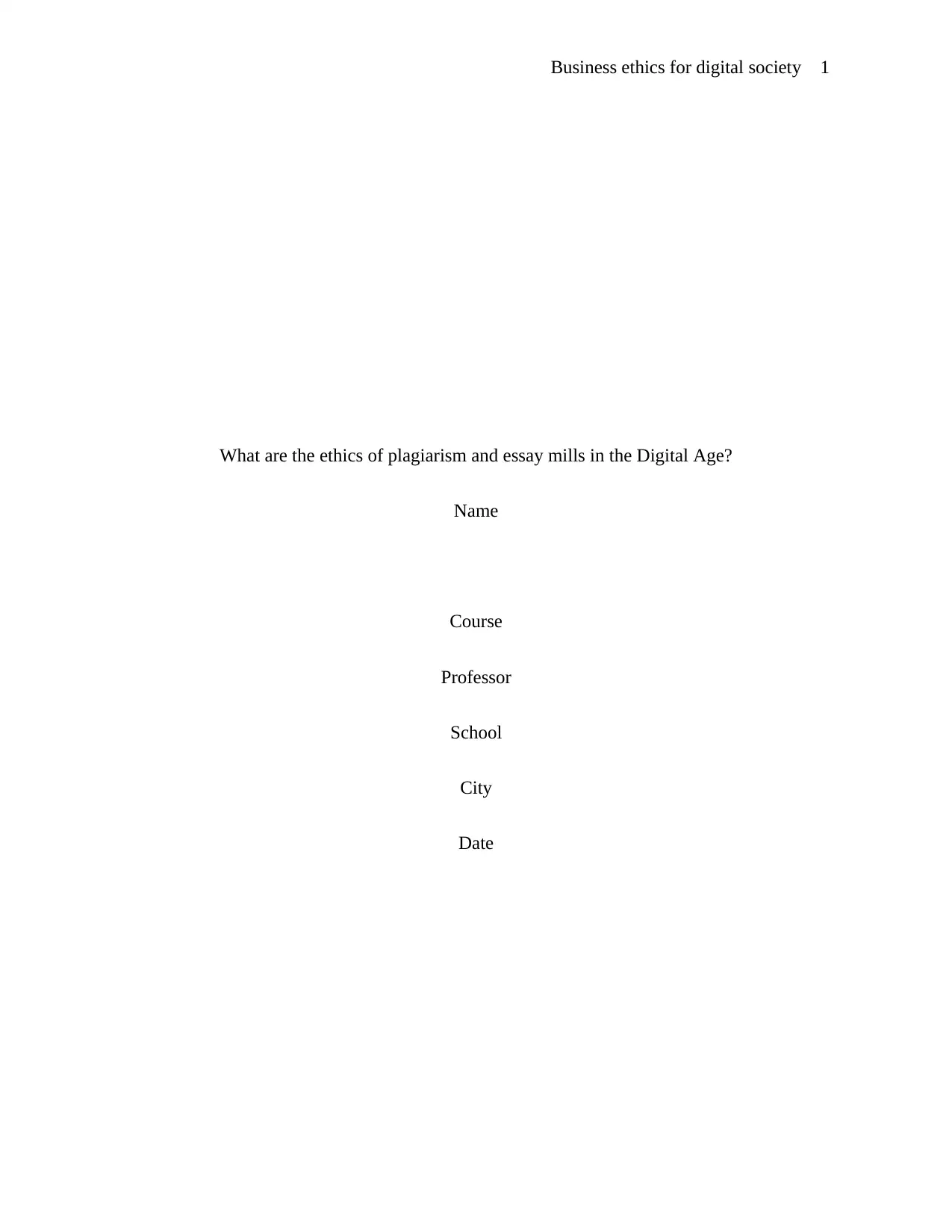
Business ethics for digital society 1
What are the ethics of plagiarism and essay mills in the Digital Age?
Name
Course
Professor
School
City
Date
What are the ethics of plagiarism and essay mills in the Digital Age?
Name
Course
Professor
School
City
Date
Paraphrase This Document
Need a fresh take? Get an instant paraphrase of this document with our AI Paraphraser
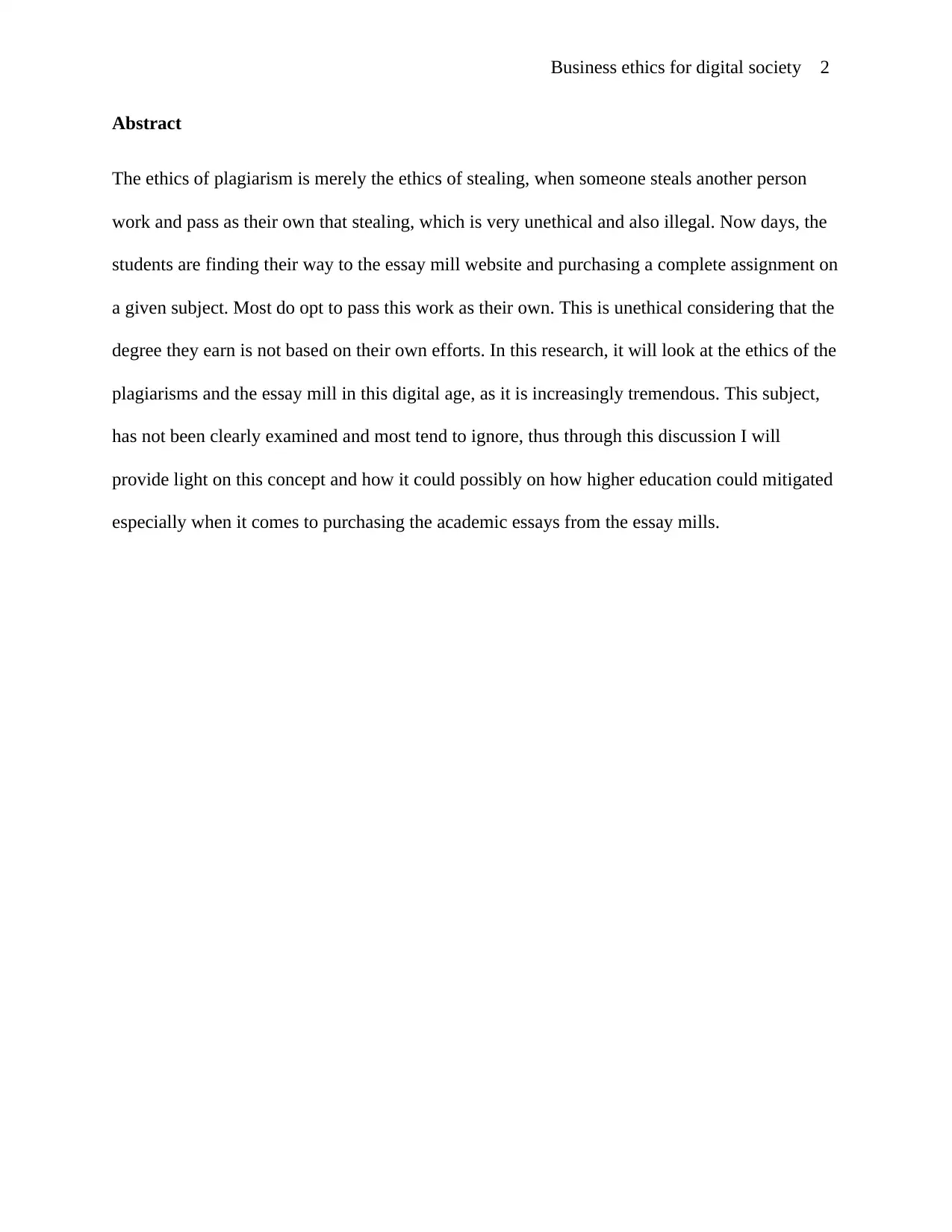
Business ethics for digital society 2
Abstract
The ethics of plagiarism is merely the ethics of stealing, when someone steals another person
work and pass as their own that stealing, which is very unethical and also illegal. Now days, the
students are finding their way to the essay mill website and purchasing a complete assignment on
a given subject. Most do opt to pass this work as their own. This is unethical considering that the
degree they earn is not based on their own efforts. In this research, it will look at the ethics of the
plagiarisms and the essay mill in this digital age, as it is increasingly tremendous. This subject,
has not been clearly examined and most tend to ignore, thus through this discussion I will
provide light on this concept and how it could possibly on how higher education could mitigated
especially when it comes to purchasing the academic essays from the essay mills.
Abstract
The ethics of plagiarism is merely the ethics of stealing, when someone steals another person
work and pass as their own that stealing, which is very unethical and also illegal. Now days, the
students are finding their way to the essay mill website and purchasing a complete assignment on
a given subject. Most do opt to pass this work as their own. This is unethical considering that the
degree they earn is not based on their own efforts. In this research, it will look at the ethics of the
plagiarisms and the essay mill in this digital age, as it is increasingly tremendous. This subject,
has not been clearly examined and most tend to ignore, thus through this discussion I will
provide light on this concept and how it could possibly on how higher education could mitigated
especially when it comes to purchasing the academic essays from the essay mills.
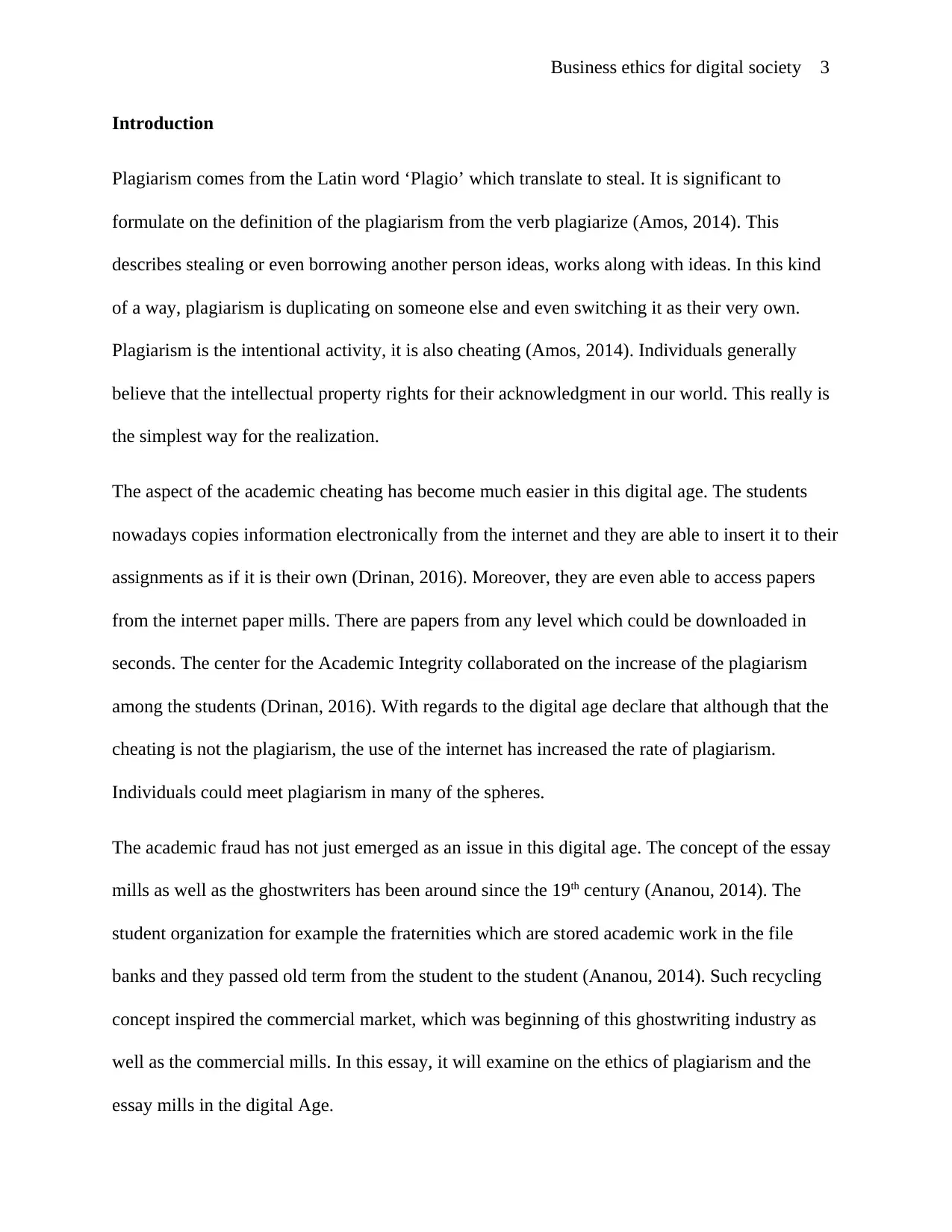
Business ethics for digital society 3
Introduction
Plagiarism comes from the Latin word ‘Plagio’ which translate to steal. It is significant to
formulate on the definition of the plagiarism from the verb plagiarize (Amos, 2014). This
describes stealing or even borrowing another person ideas, works along with ideas. In this kind
of a way, plagiarism is duplicating on someone else and even switching it as their very own.
Plagiarism is the intentional activity, it is also cheating (Amos, 2014). Individuals generally
believe that the intellectual property rights for their acknowledgment in our world. This really is
the simplest way for the realization.
The aspect of the academic cheating has become much easier in this digital age. The students
nowadays copies information electronically from the internet and they are able to insert it to their
assignments as if it is their own (Drinan, 2016). Moreover, they are even able to access papers
from the internet paper mills. There are papers from any level which could be downloaded in
seconds. The center for the Academic Integrity collaborated on the increase of the plagiarism
among the students (Drinan, 2016). With regards to the digital age declare that although that the
cheating is not the plagiarism, the use of the internet has increased the rate of plagiarism.
Individuals could meet plagiarism in many of the spheres.
The academic fraud has not just emerged as an issue in this digital age. The concept of the essay
mills as well as the ghostwriters has been around since the 19th century (Ananou, 2014). The
student organization for example the fraternities which are stored academic work in the file
banks and they passed old term from the student to the student (Ananou, 2014). Such recycling
concept inspired the commercial market, which was beginning of this ghostwriting industry as
well as the commercial mills. In this essay, it will examine on the ethics of plagiarism and the
essay mills in the digital Age.
Introduction
Plagiarism comes from the Latin word ‘Plagio’ which translate to steal. It is significant to
formulate on the definition of the plagiarism from the verb plagiarize (Amos, 2014). This
describes stealing or even borrowing another person ideas, works along with ideas. In this kind
of a way, plagiarism is duplicating on someone else and even switching it as their very own.
Plagiarism is the intentional activity, it is also cheating (Amos, 2014). Individuals generally
believe that the intellectual property rights for their acknowledgment in our world. This really is
the simplest way for the realization.
The aspect of the academic cheating has become much easier in this digital age. The students
nowadays copies information electronically from the internet and they are able to insert it to their
assignments as if it is their own (Drinan, 2016). Moreover, they are even able to access papers
from the internet paper mills. There are papers from any level which could be downloaded in
seconds. The center for the Academic Integrity collaborated on the increase of the plagiarism
among the students (Drinan, 2016). With regards to the digital age declare that although that the
cheating is not the plagiarism, the use of the internet has increased the rate of plagiarism.
Individuals could meet plagiarism in many of the spheres.
The academic fraud has not just emerged as an issue in this digital age. The concept of the essay
mills as well as the ghostwriters has been around since the 19th century (Ananou, 2014). The
student organization for example the fraternities which are stored academic work in the file
banks and they passed old term from the student to the student (Ananou, 2014). Such recycling
concept inspired the commercial market, which was beginning of this ghostwriting industry as
well as the commercial mills. In this essay, it will examine on the ethics of plagiarism and the
essay mills in the digital Age.
⊘ This is a preview!⊘
Do you want full access?
Subscribe today to unlock all pages.

Trusted by 1+ million students worldwide
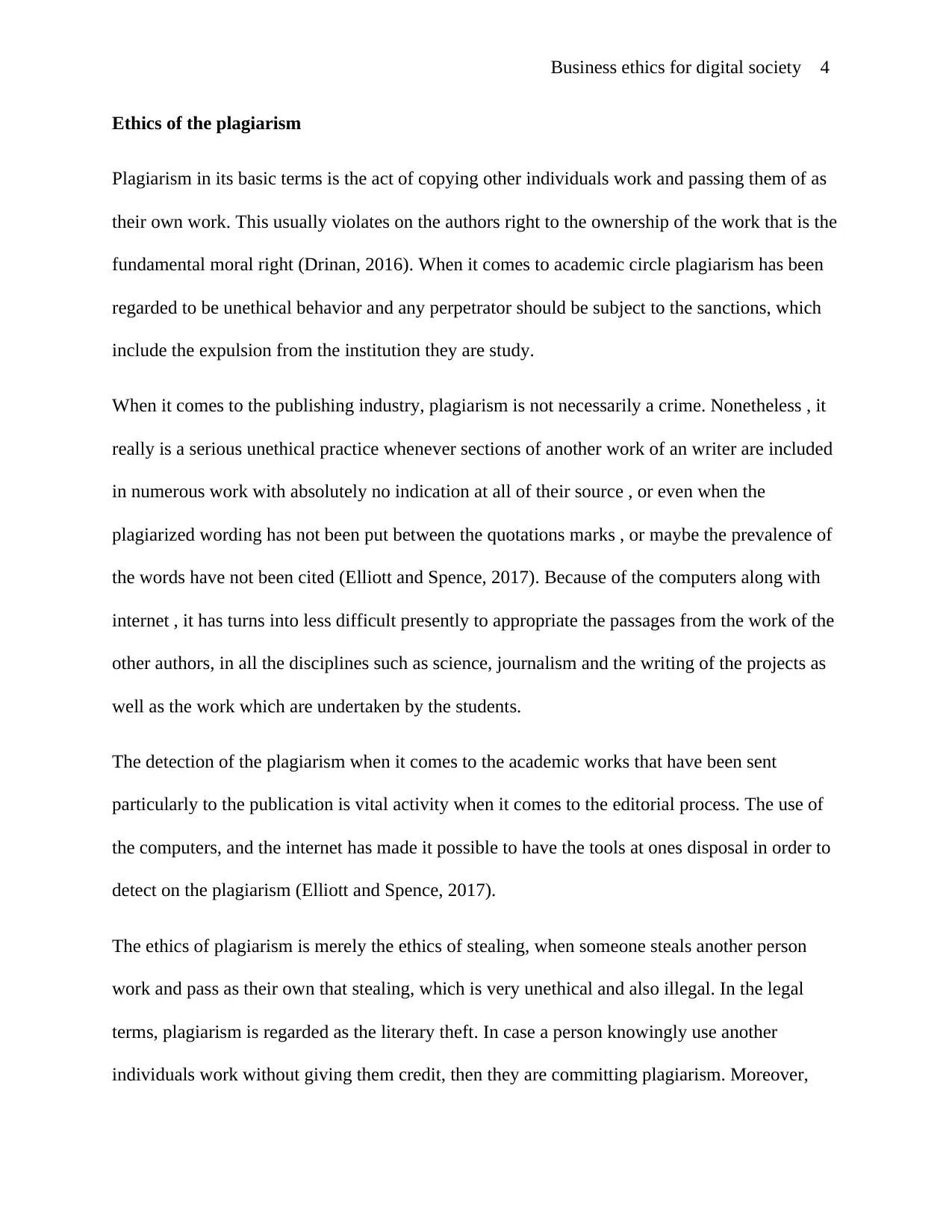
Business ethics for digital society 4
Ethics of the plagiarism
Plagiarism in its basic terms is the act of copying other individuals work and passing them of as
their own work. This usually violates on the authors right to the ownership of the work that is the
fundamental moral right (Drinan, 2016). When it comes to academic circle plagiarism has been
regarded to be unethical behavior and any perpetrator should be subject to the sanctions, which
include the expulsion from the institution they are study.
When it comes to the publishing industry, plagiarism is not necessarily a crime. Nonetheless , it
really is a serious unethical practice whenever sections of another work of an writer are included
in numerous work with absolutely no indication at all of their source , or even when the
plagiarized wording has not been put between the quotations marks , or maybe the prevalence of
the words have not been cited (Elliott and Spence, 2017). Because of the computers along with
internet , it has turns into less difficult presently to appropriate the passages from the work of the
other authors, in all the disciplines such as science, journalism and the writing of the projects as
well as the work which are undertaken by the students.
The detection of the plagiarism when it comes to the academic works that have been sent
particularly to the publication is vital activity when it comes to the editorial process. The use of
the computers, and the internet has made it possible to have the tools at ones disposal in order to
detect on the plagiarism (Elliott and Spence, 2017).
The ethics of plagiarism is merely the ethics of stealing, when someone steals another person
work and pass as their own that stealing, which is very unethical and also illegal. In the legal
terms, plagiarism is regarded as the literary theft. In case a person knowingly use another
individuals work without giving them credit, then they are committing plagiarism. Moreover,
Ethics of the plagiarism
Plagiarism in its basic terms is the act of copying other individuals work and passing them of as
their own work. This usually violates on the authors right to the ownership of the work that is the
fundamental moral right (Drinan, 2016). When it comes to academic circle plagiarism has been
regarded to be unethical behavior and any perpetrator should be subject to the sanctions, which
include the expulsion from the institution they are study.
When it comes to the publishing industry, plagiarism is not necessarily a crime. Nonetheless , it
really is a serious unethical practice whenever sections of another work of an writer are included
in numerous work with absolutely no indication at all of their source , or even when the
plagiarized wording has not been put between the quotations marks , or maybe the prevalence of
the words have not been cited (Elliott and Spence, 2017). Because of the computers along with
internet , it has turns into less difficult presently to appropriate the passages from the work of the
other authors, in all the disciplines such as science, journalism and the writing of the projects as
well as the work which are undertaken by the students.
The detection of the plagiarism when it comes to the academic works that have been sent
particularly to the publication is vital activity when it comes to the editorial process. The use of
the computers, and the internet has made it possible to have the tools at ones disposal in order to
detect on the plagiarism (Elliott and Spence, 2017).
The ethics of plagiarism is merely the ethics of stealing, when someone steals another person
work and pass as their own that stealing, which is very unethical and also illegal. In the legal
terms, plagiarism is regarded as the literary theft. In case a person knowingly use another
individuals work without giving them credit, then they are committing plagiarism. Moreover,
Paraphrase This Document
Need a fresh take? Get an instant paraphrase of this document with our AI Paraphraser
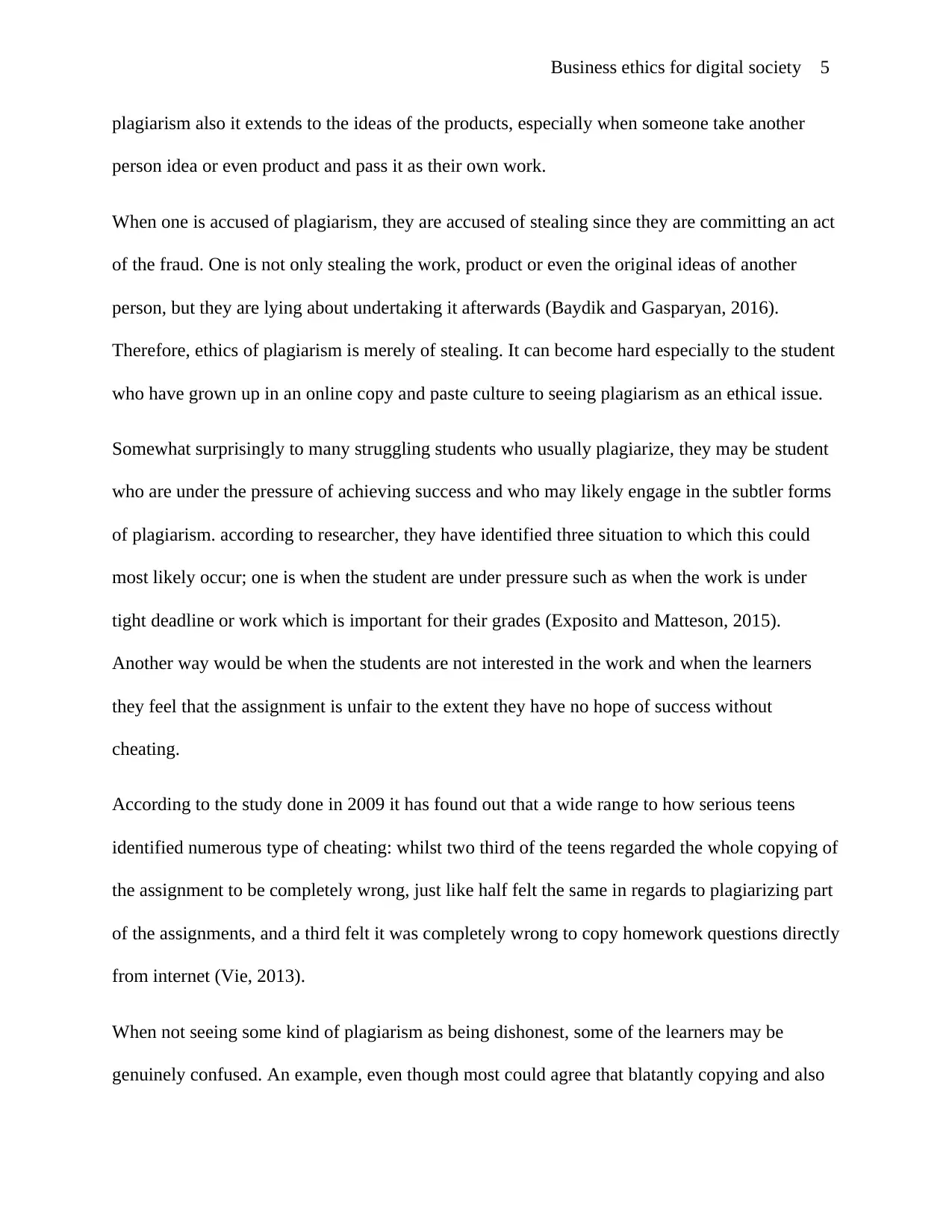
Business ethics for digital society 5
plagiarism also it extends to the ideas of the products, especially when someone take another
person idea or even product and pass it as their own work.
When one is accused of plagiarism, they are accused of stealing since they are committing an act
of the fraud. One is not only stealing the work, product or even the original ideas of another
person, but they are lying about undertaking it afterwards (Baydik and Gasparyan, 2016).
Therefore, ethics of plagiarism is merely of stealing. It can become hard especially to the student
who have grown up in an online copy and paste culture to seeing plagiarism as an ethical issue.
Somewhat surprisingly to many struggling students who usually plagiarize, they may be student
who are under the pressure of achieving success and who may likely engage in the subtler forms
of plagiarism. according to researcher, they have identified three situation to which this could
most likely occur; one is when the student are under pressure such as when the work is under
tight deadline or work which is important for their grades (Exposito and Matteson, 2015).
Another way would be when the students are not interested in the work and when the learners
they feel that the assignment is unfair to the extent they have no hope of success without
cheating.
According to the study done in 2009 it has found out that a wide range to how serious teens
identified numerous type of cheating: whilst two third of the teens regarded the whole copying of
the assignment to be completely wrong, just like half felt the same in regards to plagiarizing part
of the assignments, and a third felt it was completely wrong to copy homework questions directly
from internet (Vie, 2013).
When not seeing some kind of plagiarism as being dishonest, some of the learners may be
genuinely confused. An example, even though most could agree that blatantly copying and also
plagiarism also it extends to the ideas of the products, especially when someone take another
person idea or even product and pass it as their own work.
When one is accused of plagiarism, they are accused of stealing since they are committing an act
of the fraud. One is not only stealing the work, product or even the original ideas of another
person, but they are lying about undertaking it afterwards (Baydik and Gasparyan, 2016).
Therefore, ethics of plagiarism is merely of stealing. It can become hard especially to the student
who have grown up in an online copy and paste culture to seeing plagiarism as an ethical issue.
Somewhat surprisingly to many struggling students who usually plagiarize, they may be student
who are under the pressure of achieving success and who may likely engage in the subtler forms
of plagiarism. according to researcher, they have identified three situation to which this could
most likely occur; one is when the student are under pressure such as when the work is under
tight deadline or work which is important for their grades (Exposito and Matteson, 2015).
Another way would be when the students are not interested in the work and when the learners
they feel that the assignment is unfair to the extent they have no hope of success without
cheating.
According to the study done in 2009 it has found out that a wide range to how serious teens
identified numerous type of cheating: whilst two third of the teens regarded the whole copying of
the assignment to be completely wrong, just like half felt the same in regards to plagiarizing part
of the assignments, and a third felt it was completely wrong to copy homework questions directly
from internet (Vie, 2013).
When not seeing some kind of plagiarism as being dishonest, some of the learners may be
genuinely confused. An example, even though most could agree that blatantly copying and also
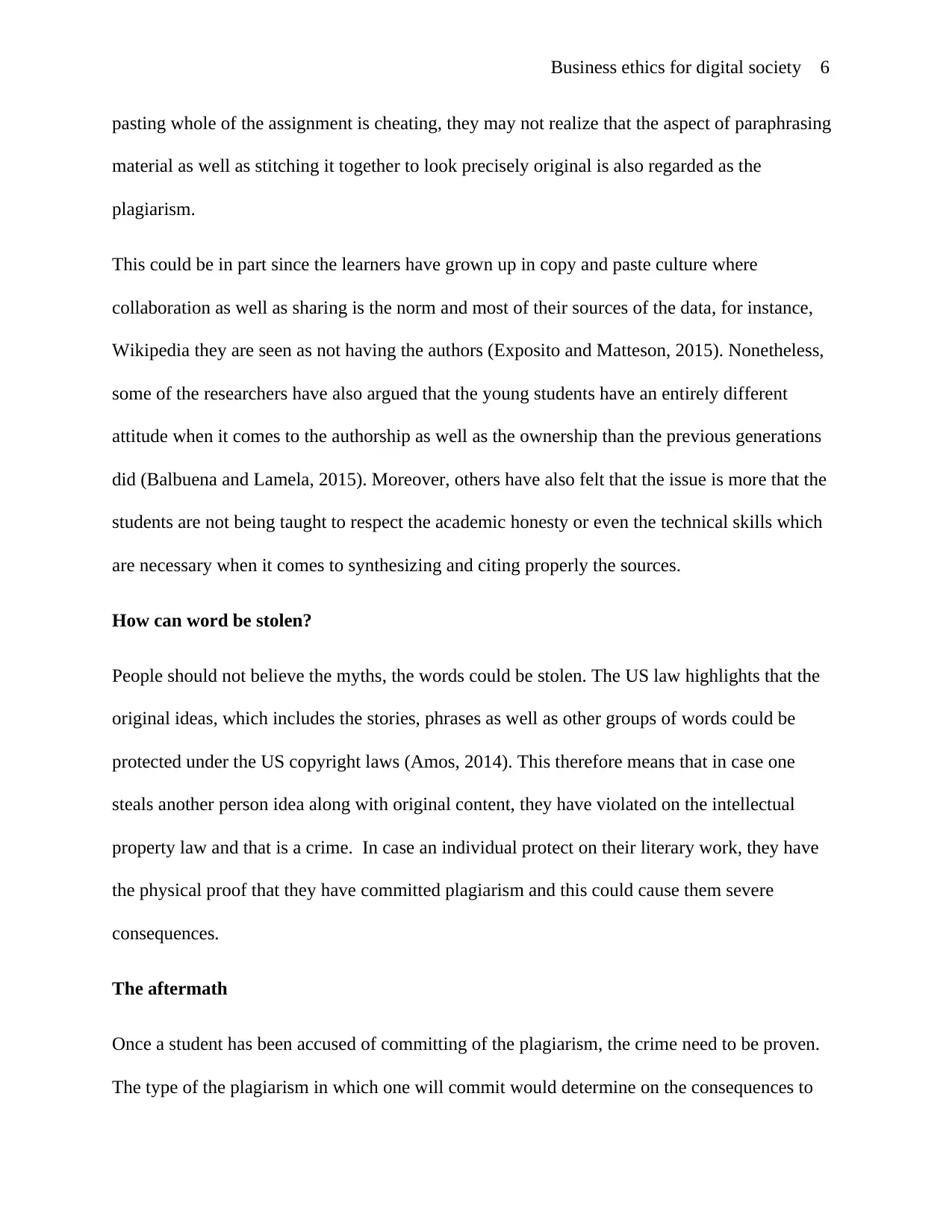
Business ethics for digital society 6
pasting whole of the assignment is cheating, they may not realize that the aspect of paraphrasing
material as well as stitching it together to look precisely original is also regarded as the
plagiarism.
This could be in part since the learners have grown up in copy and paste culture where
collaboration as well as sharing is the norm and most of their sources of the data, for instance,
Wikipedia they are seen as not having the authors (Exposito and Matteson, 2015). Nonetheless,
some of the researchers have also argued that the young students have an entirely different
attitude when it comes to the authorship as well as the ownership than the previous generations
did (Balbuena and Lamela, 2015). Moreover, others have also felt that the issue is more that the
students are not being taught to respect the academic honesty or even the technical skills which
are necessary when it comes to synthesizing and citing properly the sources.
How can word be stolen?
People should not believe the myths, the words could be stolen. The US law highlights that the
original ideas, which includes the stories, phrases as well as other groups of words could be
protected under the US copyright laws (Amos, 2014). This therefore means that in case one
steals another person idea along with original content, they have violated on the intellectual
property law and that is a crime. In case an individual protect on their literary work, they have
the physical proof that they have committed plagiarism and this could cause them severe
consequences.
The aftermath
Once a student has been accused of committing of the plagiarism, the crime need to be proven.
The type of the plagiarism in which one will commit would determine on the consequences to
pasting whole of the assignment is cheating, they may not realize that the aspect of paraphrasing
material as well as stitching it together to look precisely original is also regarded as the
plagiarism.
This could be in part since the learners have grown up in copy and paste culture where
collaboration as well as sharing is the norm and most of their sources of the data, for instance,
Wikipedia they are seen as not having the authors (Exposito and Matteson, 2015). Nonetheless,
some of the researchers have also argued that the young students have an entirely different
attitude when it comes to the authorship as well as the ownership than the previous generations
did (Balbuena and Lamela, 2015). Moreover, others have also felt that the issue is more that the
students are not being taught to respect the academic honesty or even the technical skills which
are necessary when it comes to synthesizing and citing properly the sources.
How can word be stolen?
People should not believe the myths, the words could be stolen. The US law highlights that the
original ideas, which includes the stories, phrases as well as other groups of words could be
protected under the US copyright laws (Amos, 2014). This therefore means that in case one
steals another person idea along with original content, they have violated on the intellectual
property law and that is a crime. In case an individual protect on their literary work, they have
the physical proof that they have committed plagiarism and this could cause them severe
consequences.
The aftermath
Once a student has been accused of committing of the plagiarism, the crime need to be proven.
The type of the plagiarism in which one will commit would determine on the consequences to
⊘ This is a preview!⊘
Do you want full access?
Subscribe today to unlock all pages.

Trusted by 1+ million students worldwide
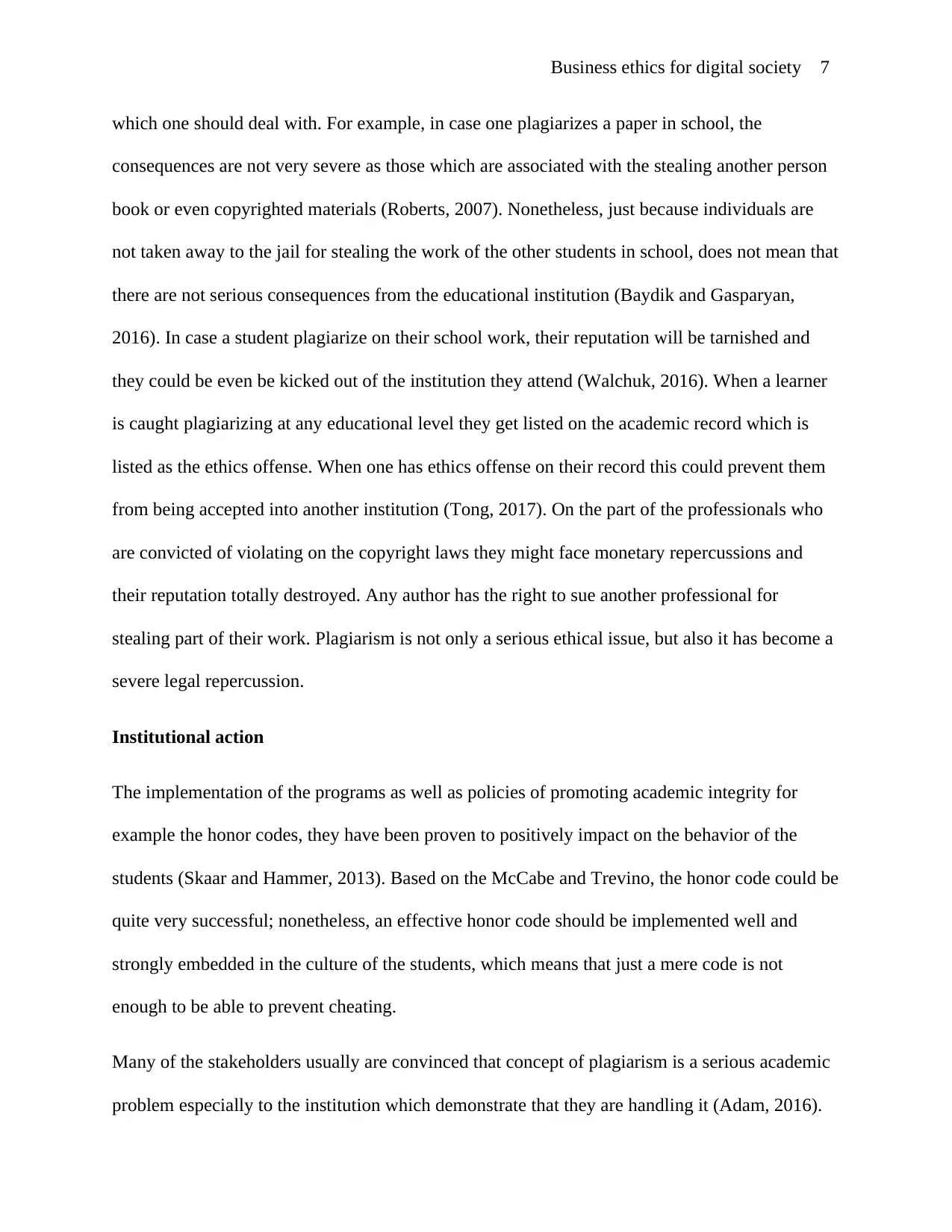
Business ethics for digital society 7
which one should deal with. For example, in case one plagiarizes a paper in school, the
consequences are not very severe as those which are associated with the stealing another person
book or even copyrighted materials (Roberts, 2007). Nonetheless, just because individuals are
not taken away to the jail for stealing the work of the other students in school, does not mean that
there are not serious consequences from the educational institution (Baydik and Gasparyan,
2016). In case a student plagiarize on their school work, their reputation will be tarnished and
they could be even be kicked out of the institution they attend (Walchuk, 2016). When a learner
is caught plagiarizing at any educational level they get listed on the academic record which is
listed as the ethics offense. When one has ethics offense on their record this could prevent them
from being accepted into another institution (Tong, 2017). On the part of the professionals who
are convicted of violating on the copyright laws they might face monetary repercussions and
their reputation totally destroyed. Any author has the right to sue another professional for
stealing part of their work. Plagiarism is not only a serious ethical issue, but also it has become a
severe legal repercussion.
Institutional action
The implementation of the programs as well as policies of promoting academic integrity for
example the honor codes, they have been proven to positively impact on the behavior of the
students (Skaar and Hammer, 2013). Based on the McCabe and Trevino, the honor code could be
quite very successful; nonetheless, an effective honor code should be implemented well and
strongly embedded in the culture of the students, which means that just a mere code is not
enough to be able to prevent cheating.
Many of the stakeholders usually are convinced that concept of plagiarism is a serious academic
problem especially to the institution which demonstrate that they are handling it (Adam, 2016).
which one should deal with. For example, in case one plagiarizes a paper in school, the
consequences are not very severe as those which are associated with the stealing another person
book or even copyrighted materials (Roberts, 2007). Nonetheless, just because individuals are
not taken away to the jail for stealing the work of the other students in school, does not mean that
there are not serious consequences from the educational institution (Baydik and Gasparyan,
2016). In case a student plagiarize on their school work, their reputation will be tarnished and
they could be even be kicked out of the institution they attend (Walchuk, 2016). When a learner
is caught plagiarizing at any educational level they get listed on the academic record which is
listed as the ethics offense. When one has ethics offense on their record this could prevent them
from being accepted into another institution (Tong, 2017). On the part of the professionals who
are convicted of violating on the copyright laws they might face monetary repercussions and
their reputation totally destroyed. Any author has the right to sue another professional for
stealing part of their work. Plagiarism is not only a serious ethical issue, but also it has become a
severe legal repercussion.
Institutional action
The implementation of the programs as well as policies of promoting academic integrity for
example the honor codes, they have been proven to positively impact on the behavior of the
students (Skaar and Hammer, 2013). Based on the McCabe and Trevino, the honor code could be
quite very successful; nonetheless, an effective honor code should be implemented well and
strongly embedded in the culture of the students, which means that just a mere code is not
enough to be able to prevent cheating.
Many of the stakeholders usually are convinced that concept of plagiarism is a serious academic
problem especially to the institution which demonstrate that they are handling it (Adam, 2016).
Paraphrase This Document
Need a fresh take? Get an instant paraphrase of this document with our AI Paraphraser
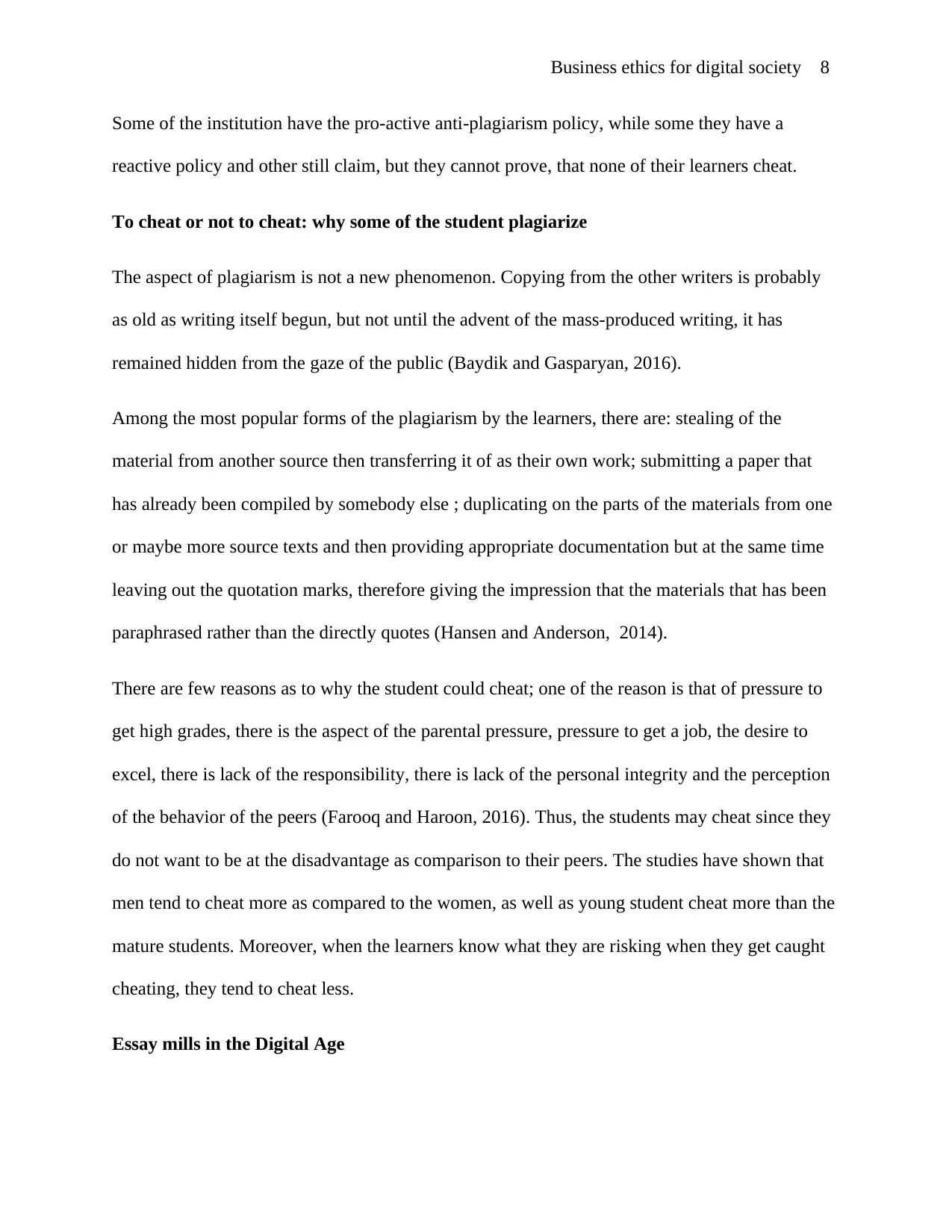
Business ethics for digital society 8
Some of the institution have the pro-active anti-plagiarism policy, while some they have a
reactive policy and other still claim, but they cannot prove, that none of their learners cheat.
To cheat or not to cheat: why some of the student plagiarize
The aspect of plagiarism is not a new phenomenon. Copying from the other writers is probably
as old as writing itself begun, but not until the advent of the mass-produced writing, it has
remained hidden from the gaze of the public (Baydik and Gasparyan, 2016).
Among the most popular forms of the plagiarism by the learners, there are: stealing of the
material from another source then transferring it of as their own work; submitting a paper that
has already been compiled by somebody else ; duplicating on the parts of the materials from one
or maybe more source texts and then providing appropriate documentation but at the same time
leaving out the quotation marks, therefore giving the impression that the materials that has been
paraphrased rather than the directly quotes (Hansen and Anderson, 2014).
There are few reasons as to why the student could cheat; one of the reason is that of pressure to
get high grades, there is the aspect of the parental pressure, pressure to get a job, the desire to
excel, there is lack of the responsibility, there is lack of the personal integrity and the perception
of the behavior of the peers (Farooq and Haroon, 2016). Thus, the students may cheat since they
do not want to be at the disadvantage as comparison to their peers. The studies have shown that
men tend to cheat more as compared to the women, as well as young student cheat more than the
mature students. Moreover, when the learners know what they are risking when they get caught
cheating, they tend to cheat less.
Essay mills in the Digital Age
Some of the institution have the pro-active anti-plagiarism policy, while some they have a
reactive policy and other still claim, but they cannot prove, that none of their learners cheat.
To cheat or not to cheat: why some of the student plagiarize
The aspect of plagiarism is not a new phenomenon. Copying from the other writers is probably
as old as writing itself begun, but not until the advent of the mass-produced writing, it has
remained hidden from the gaze of the public (Baydik and Gasparyan, 2016).
Among the most popular forms of the plagiarism by the learners, there are: stealing of the
material from another source then transferring it of as their own work; submitting a paper that
has already been compiled by somebody else ; duplicating on the parts of the materials from one
or maybe more source texts and then providing appropriate documentation but at the same time
leaving out the quotation marks, therefore giving the impression that the materials that has been
paraphrased rather than the directly quotes (Hansen and Anderson, 2014).
There are few reasons as to why the student could cheat; one of the reason is that of pressure to
get high grades, there is the aspect of the parental pressure, pressure to get a job, the desire to
excel, there is lack of the responsibility, there is lack of the personal integrity and the perception
of the behavior of the peers (Farooq and Haroon, 2016). Thus, the students may cheat since they
do not want to be at the disadvantage as comparison to their peers. The studies have shown that
men tend to cheat more as compared to the women, as well as young student cheat more than the
mature students. Moreover, when the learners know what they are risking when they get caught
cheating, they tend to cheat less.
Essay mills in the Digital Age
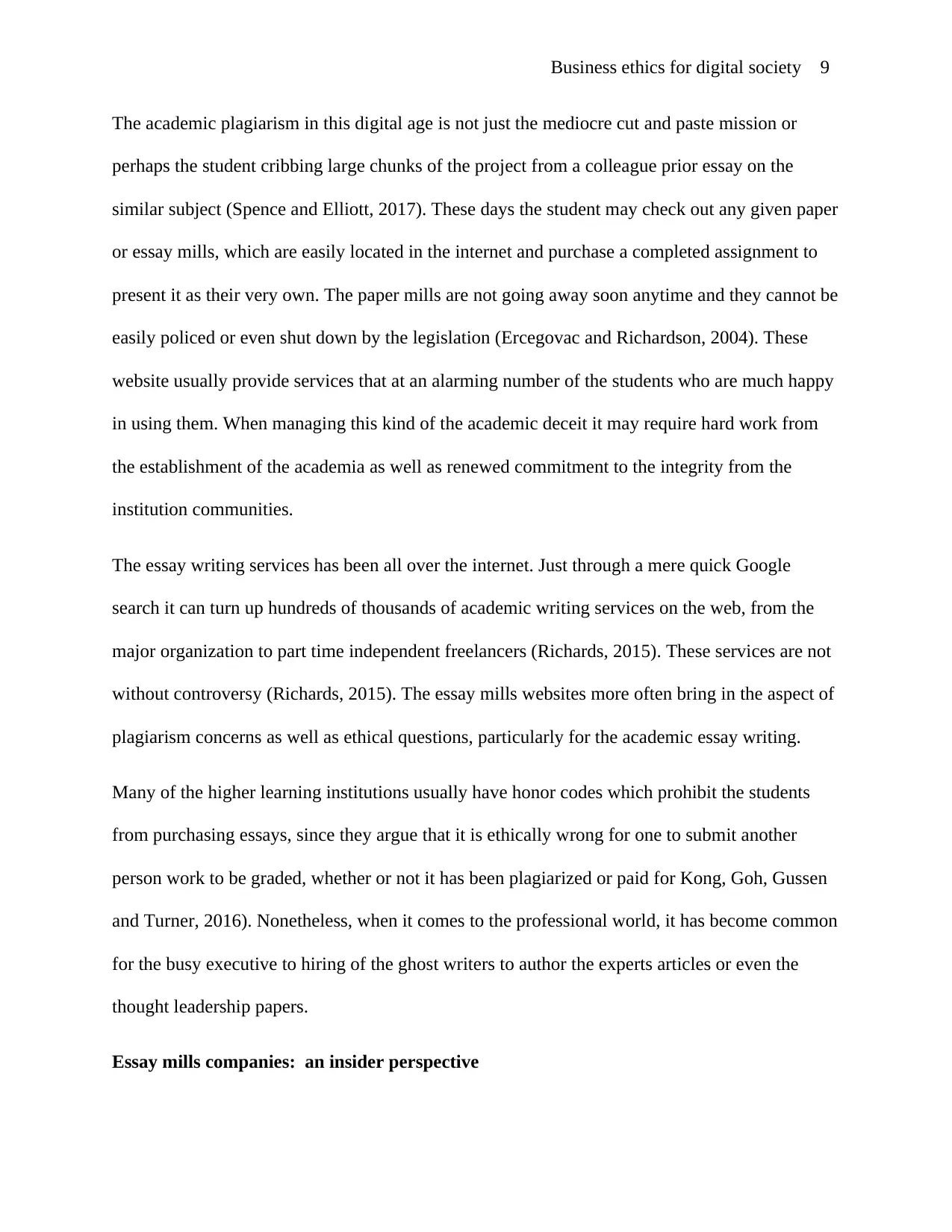
Business ethics for digital society 9
The academic plagiarism in this digital age is not just the mediocre cut and paste mission or
perhaps the student cribbing large chunks of the project from a colleague prior essay on the
similar subject (Spence and Elliott, 2017). These days the student may check out any given paper
or essay mills, which are easily located in the internet and purchase a completed assignment to
present it as their very own. The paper mills are not going away soon anytime and they cannot be
easily policed or even shut down by the legislation (Ercegovac and Richardson, 2004). These
website usually provide services that at an alarming number of the students who are much happy
in using them. When managing this kind of the academic deceit it may require hard work from
the establishment of the academia as well as renewed commitment to the integrity from the
institution communities.
The essay writing services has been all over the internet. Just through a mere quick Google
search it can turn up hundreds of thousands of academic writing services on the web, from the
major organization to part time independent freelancers (Richards, 2015). These services are not
without controversy (Richards, 2015). The essay mills websites more often bring in the aspect of
plagiarism concerns as well as ethical questions, particularly for the academic essay writing.
Many of the higher learning institutions usually have honor codes which prohibit the students
from purchasing essays, since they argue that it is ethically wrong for one to submit another
person work to be graded, whether or not it has been plagiarized or paid for Kong, Goh, Gussen
and Turner, 2016). Nonetheless, when it comes to the professional world, it has become common
for the busy executive to hiring of the ghost writers to author the experts articles or even the
thought leadership papers.
Essay mills companies: an insider perspective
The academic plagiarism in this digital age is not just the mediocre cut and paste mission or
perhaps the student cribbing large chunks of the project from a colleague prior essay on the
similar subject (Spence and Elliott, 2017). These days the student may check out any given paper
or essay mills, which are easily located in the internet and purchase a completed assignment to
present it as their very own. The paper mills are not going away soon anytime and they cannot be
easily policed or even shut down by the legislation (Ercegovac and Richardson, 2004). These
website usually provide services that at an alarming number of the students who are much happy
in using them. When managing this kind of the academic deceit it may require hard work from
the establishment of the academia as well as renewed commitment to the integrity from the
institution communities.
The essay writing services has been all over the internet. Just through a mere quick Google
search it can turn up hundreds of thousands of academic writing services on the web, from the
major organization to part time independent freelancers (Richards, 2015). These services are not
without controversy (Richards, 2015). The essay mills websites more often bring in the aspect of
plagiarism concerns as well as ethical questions, particularly for the academic essay writing.
Many of the higher learning institutions usually have honor codes which prohibit the students
from purchasing essays, since they argue that it is ethically wrong for one to submit another
person work to be graded, whether or not it has been plagiarized or paid for Kong, Goh, Gussen
and Turner, 2016). Nonetheless, when it comes to the professional world, it has become common
for the busy executive to hiring of the ghost writers to author the experts articles or even the
thought leadership papers.
Essay mills companies: an insider perspective
⊘ This is a preview!⊘
Do you want full access?
Subscribe today to unlock all pages.

Trusted by 1+ million students worldwide
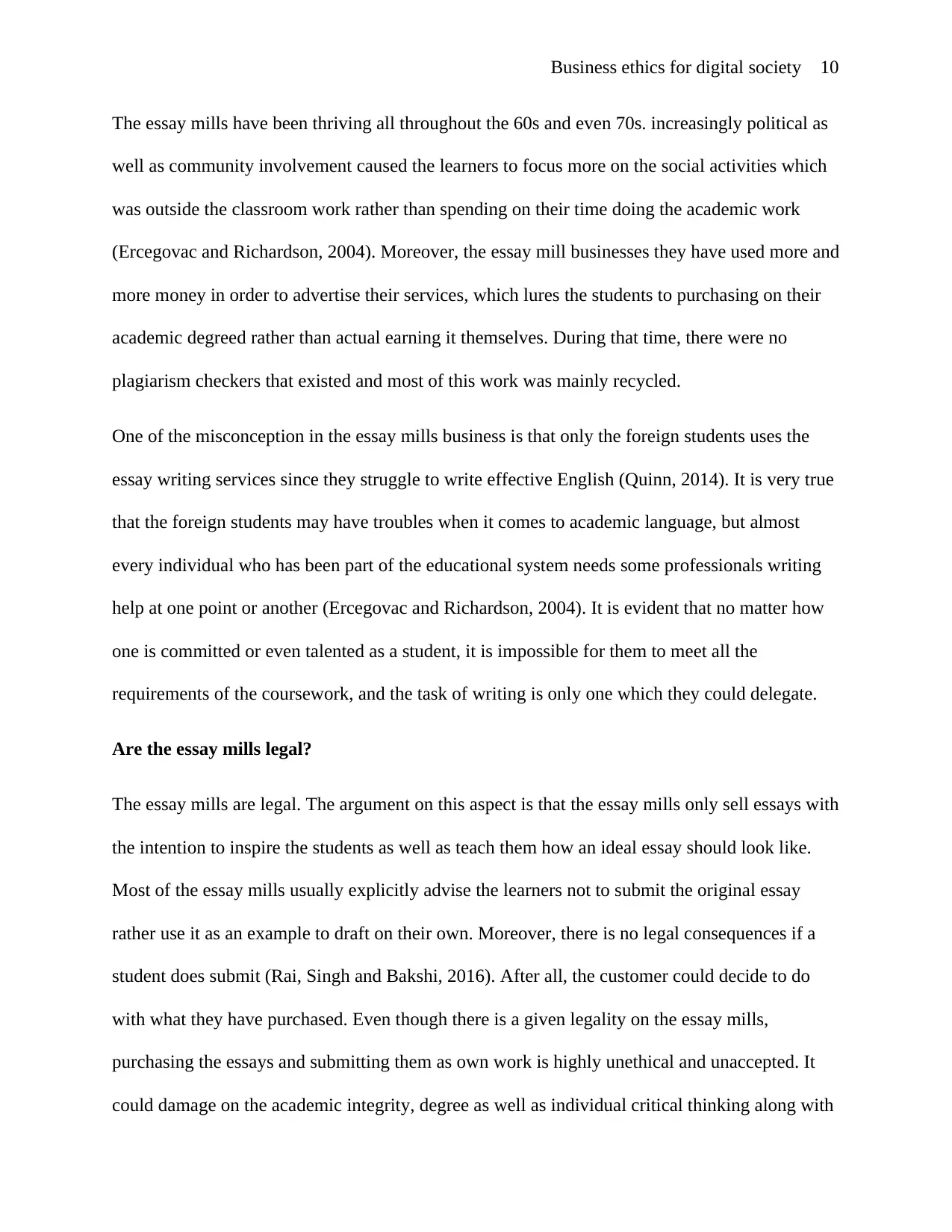
Business ethics for digital society 10
The essay mills have been thriving all throughout the 60s and even 70s. increasingly political as
well as community involvement caused the learners to focus more on the social activities which
was outside the classroom work rather than spending on their time doing the academic work
(Ercegovac and Richardson, 2004). Moreover, the essay mill businesses they have used more and
more money in order to advertise their services, which lures the students to purchasing on their
academic degreed rather than actual earning it themselves. During that time, there were no
plagiarism checkers that existed and most of this work was mainly recycled.
One of the misconception in the essay mills business is that only the foreign students uses the
essay writing services since they struggle to write effective English (Quinn, 2014). It is very true
that the foreign students may have troubles when it comes to academic language, but almost
every individual who has been part of the educational system needs some professionals writing
help at one point or another (Ercegovac and Richardson, 2004). It is evident that no matter how
one is committed or even talented as a student, it is impossible for them to meet all the
requirements of the coursework, and the task of writing is only one which they could delegate.
Are the essay mills legal?
The essay mills are legal. The argument on this aspect is that the essay mills only sell essays with
the intention to inspire the students as well as teach them how an ideal essay should look like.
Most of the essay mills usually explicitly advise the learners not to submit the original essay
rather use it as an example to draft on their own. Moreover, there is no legal consequences if a
student does submit (Rai, Singh and Bakshi, 2016). After all, the customer could decide to do
with what they have purchased. Even though there is a given legality on the essay mills,
purchasing the essays and submitting them as own work is highly unethical and unaccepted. It
could damage on the academic integrity, degree as well as individual critical thinking along with
The essay mills have been thriving all throughout the 60s and even 70s. increasingly political as
well as community involvement caused the learners to focus more on the social activities which
was outside the classroom work rather than spending on their time doing the academic work
(Ercegovac and Richardson, 2004). Moreover, the essay mill businesses they have used more and
more money in order to advertise their services, which lures the students to purchasing on their
academic degreed rather than actual earning it themselves. During that time, there were no
plagiarism checkers that existed and most of this work was mainly recycled.
One of the misconception in the essay mills business is that only the foreign students uses the
essay writing services since they struggle to write effective English (Quinn, 2014). It is very true
that the foreign students may have troubles when it comes to academic language, but almost
every individual who has been part of the educational system needs some professionals writing
help at one point or another (Ercegovac and Richardson, 2004). It is evident that no matter how
one is committed or even talented as a student, it is impossible for them to meet all the
requirements of the coursework, and the task of writing is only one which they could delegate.
Are the essay mills legal?
The essay mills are legal. The argument on this aspect is that the essay mills only sell essays with
the intention to inspire the students as well as teach them how an ideal essay should look like.
Most of the essay mills usually explicitly advise the learners not to submit the original essay
rather use it as an example to draft on their own. Moreover, there is no legal consequences if a
student does submit (Rai, Singh and Bakshi, 2016). After all, the customer could decide to do
with what they have purchased. Even though there is a given legality on the essay mills,
purchasing the essays and submitting them as own work is highly unethical and unaccepted. It
could damage on the academic integrity, degree as well as individual critical thinking along with
Paraphrase This Document
Need a fresh take? Get an instant paraphrase of this document with our AI Paraphraser
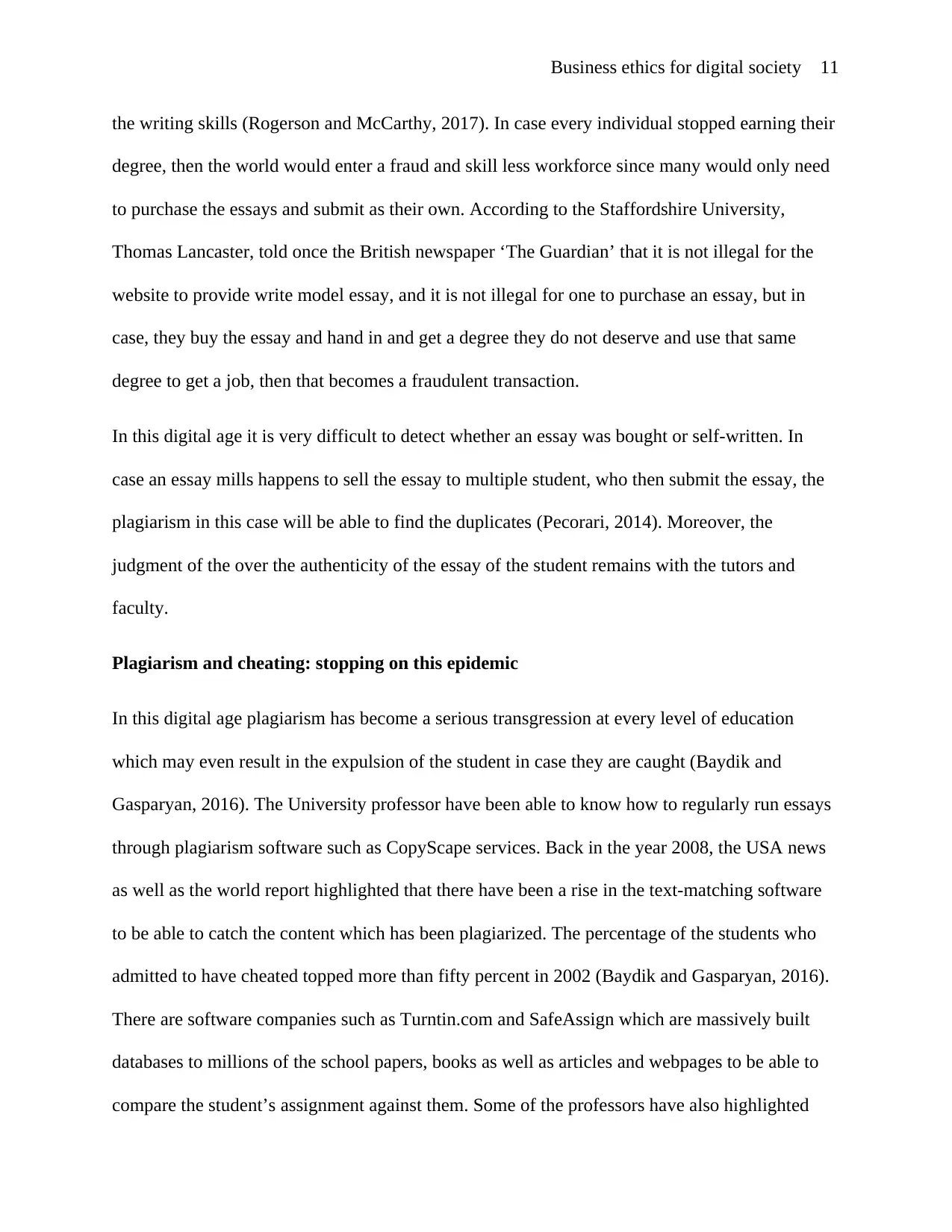
Business ethics for digital society 11
the writing skills (Rogerson and McCarthy, 2017). In case every individual stopped earning their
degree, then the world would enter a fraud and skill less workforce since many would only need
to purchase the essays and submit as their own. According to the Staffordshire University,
Thomas Lancaster, told once the British newspaper ‘The Guardian’ that it is not illegal for the
website to provide write model essay, and it is not illegal for one to purchase an essay, but in
case, they buy the essay and hand in and get a degree they do not deserve and use that same
degree to get a job, then that becomes a fraudulent transaction.
In this digital age it is very difficult to detect whether an essay was bought or self-written. In
case an essay mills happens to sell the essay to multiple student, who then submit the essay, the
plagiarism in this case will be able to find the duplicates (Pecorari, 2014). Moreover, the
judgment of the over the authenticity of the essay of the student remains with the tutors and
faculty.
Plagiarism and cheating: stopping on this epidemic
In this digital age plagiarism has become a serious transgression at every level of education
which may even result in the expulsion of the student in case they are caught (Baydik and
Gasparyan, 2016). The University professor have been able to know how to regularly run essays
through plagiarism software such as CopyScape services. Back in the year 2008, the USA news
as well as the world report highlighted that there have been a rise in the text-matching software
to be able to catch the content which has been plagiarized. The percentage of the students who
admitted to have cheated topped more than fifty percent in 2002 (Baydik and Gasparyan, 2016).
There are software companies such as Turntin.com and SafeAssign which are massively built
databases to millions of the school papers, books as well as articles and webpages to be able to
compare the student’s assignment against them. Some of the professors have also highlighted
the writing skills (Rogerson and McCarthy, 2017). In case every individual stopped earning their
degree, then the world would enter a fraud and skill less workforce since many would only need
to purchase the essays and submit as their own. According to the Staffordshire University,
Thomas Lancaster, told once the British newspaper ‘The Guardian’ that it is not illegal for the
website to provide write model essay, and it is not illegal for one to purchase an essay, but in
case, they buy the essay and hand in and get a degree they do not deserve and use that same
degree to get a job, then that becomes a fraudulent transaction.
In this digital age it is very difficult to detect whether an essay was bought or self-written. In
case an essay mills happens to sell the essay to multiple student, who then submit the essay, the
plagiarism in this case will be able to find the duplicates (Pecorari, 2014). Moreover, the
judgment of the over the authenticity of the essay of the student remains with the tutors and
faculty.
Plagiarism and cheating: stopping on this epidemic
In this digital age plagiarism has become a serious transgression at every level of education
which may even result in the expulsion of the student in case they are caught (Baydik and
Gasparyan, 2016). The University professor have been able to know how to regularly run essays
through plagiarism software such as CopyScape services. Back in the year 2008, the USA news
as well as the world report highlighted that there have been a rise in the text-matching software
to be able to catch the content which has been plagiarized. The percentage of the students who
admitted to have cheated topped more than fifty percent in 2002 (Baydik and Gasparyan, 2016).
There are software companies such as Turntin.com and SafeAssign which are massively built
databases to millions of the school papers, books as well as articles and webpages to be able to
compare the student’s assignment against them. Some of the professors have also highlighted
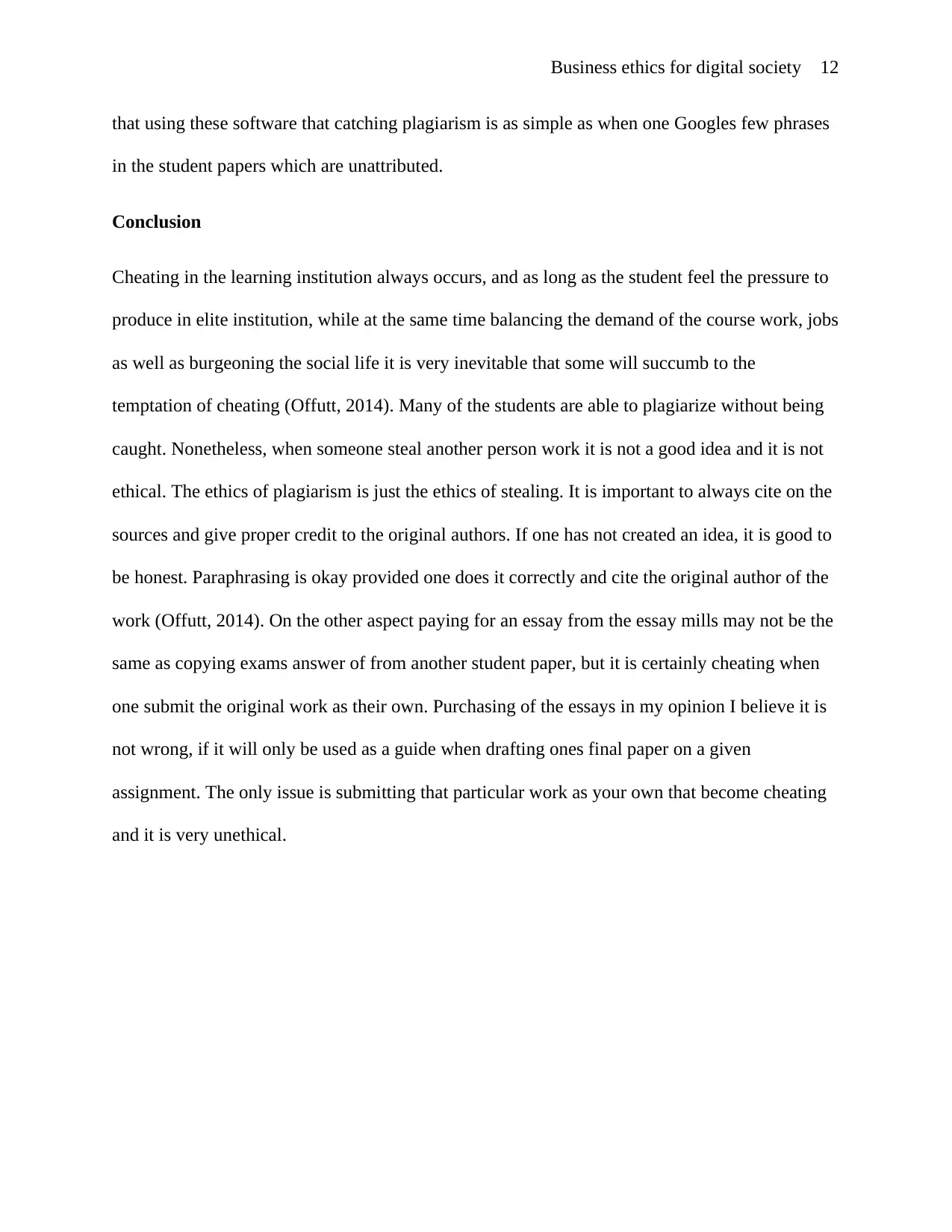
Business ethics for digital society 12
that using these software that catching plagiarism is as simple as when one Googles few phrases
in the student papers which are unattributed.
Conclusion
Cheating in the learning institution always occurs, and as long as the student feel the pressure to
produce in elite institution, while at the same time balancing the demand of the course work, jobs
as well as burgeoning the social life it is very inevitable that some will succumb to the
temptation of cheating (Offutt, 2014). Many of the students are able to plagiarize without being
caught. Nonetheless, when someone steal another person work it is not a good idea and it is not
ethical. The ethics of plagiarism is just the ethics of stealing. It is important to always cite on the
sources and give proper credit to the original authors. If one has not created an idea, it is good to
be honest. Paraphrasing is okay provided one does it correctly and cite the original author of the
work (Offutt, 2014). On the other aspect paying for an essay from the essay mills may not be the
same as copying exams answer of from another student paper, but it is certainly cheating when
one submit the original work as their own. Purchasing of the essays in my opinion I believe it is
not wrong, if it will only be used as a guide when drafting ones final paper on a given
assignment. The only issue is submitting that particular work as your own that become cheating
and it is very unethical.
that using these software that catching plagiarism is as simple as when one Googles few phrases
in the student papers which are unattributed.
Conclusion
Cheating in the learning institution always occurs, and as long as the student feel the pressure to
produce in elite institution, while at the same time balancing the demand of the course work, jobs
as well as burgeoning the social life it is very inevitable that some will succumb to the
temptation of cheating (Offutt, 2014). Many of the students are able to plagiarize without being
caught. Nonetheless, when someone steal another person work it is not a good idea and it is not
ethical. The ethics of plagiarism is just the ethics of stealing. It is important to always cite on the
sources and give proper credit to the original authors. If one has not created an idea, it is good to
be honest. Paraphrasing is okay provided one does it correctly and cite the original author of the
work (Offutt, 2014). On the other aspect paying for an essay from the essay mills may not be the
same as copying exams answer of from another student paper, but it is certainly cheating when
one submit the original work as their own. Purchasing of the essays in my opinion I believe it is
not wrong, if it will only be used as a guide when drafting ones final paper on a given
assignment. The only issue is submitting that particular work as your own that become cheating
and it is very unethical.
⊘ This is a preview!⊘
Do you want full access?
Subscribe today to unlock all pages.

Trusted by 1+ million students worldwide
1 out of 14
Related Documents
Your All-in-One AI-Powered Toolkit for Academic Success.
+13062052269
info@desklib.com
Available 24*7 on WhatsApp / Email
![[object Object]](/_next/static/media/star-bottom.7253800d.svg)
Unlock your academic potential
Copyright © 2020–2026 A2Z Services. All Rights Reserved. Developed and managed by ZUCOL.





